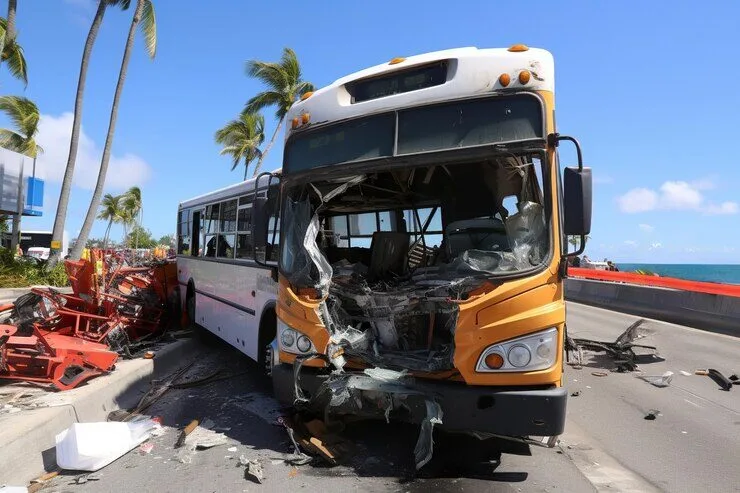Navigating bus accident insurance claims Phoenix requires a deep understanding of policy structures and insurer tactics. At Lebovitz Law Group, our knowledgeable bus accident lawyers in Phoenix guide victims through this complex process, especially when facing dealings with insurers after serious collisions.
We help injured passengers review insurance policies, identify responsible parties, and build cases for total compensation. The insurance landscape can be confusing—but with the right legal team, you don’t have to go through this alone. Find out more about our main services and how we defend your rights.
Understanding the Insurance Landscape After a Bus Accident
Bus accidents often involve multiple insurance policies and several parties. Understanding how policy coverage works is crucial to receiving full compensation.
Insurable parties typically include:
- The bus company or transit authority
- Individual drivers or staff
- Other motorists involved
- Uninsured/underinsured motorist policies
- Personal or employer policies
Our Phoenix attorneys specialize in unraveling these layers to prevent overlap or underpayment.
Types of Insurance Policies Involved in Bus Crashes
Liability Insurance from Bus Operators
This is the primary coverage used when the bus driver is at fault. It pays for:
- Medical expenses
- Lost wages
- Property damage
- Non-economic damages like pain and suffering
Uninsured/Underinsured Motorist Coverage
If another vehicle caused the accident and lacks sufficient coverage, you may rely on your own UM/UIM policies—or the bus operator’s excess insurance—to fill gaps.
Personal or Employer Medical Coverage
In many cases, clients use personal health insurance or workers’ compensation for immediate treatment. These costs are later recouped during the settlement process after insurer payouts.
Common Issues When Dealing With Insurers
Insurance companies often use several tactics to limit payouts. Understanding these can help you prepare.
- Delaying compensation by requesting excessive documentation
- Disputing severity or cause of injuries
- Offering lowball settlements before a full evaluation
Our legal team negotiates aggressively to counter these strategies while focusing on maximizing compensation for clients.
Table: Typical Insurance Tactics After a Bus Crash
| Insurer Tactic | Potential Impact | Preventive Strategy |
| Requesting repetitive docs | Delays your recovery funds | Document clearly, respond promptly |
| Disputing injury causation | Could deny certain claims | Use expert medical reports |
| Offering lump-sum deals | May undervalue your case | Review offer with your attorney |
| Minimizing non‑economic loss | Reduces settlement for pain/suffering | Keep emotional journals and seek counseling |
Why Review Policy Coverage Thoroughly
Early in the process, your attorney helps identify:
- Limits on liability policies
- Types of claims covered (e.g., personal injury vs. catastrophic injury)
- Notice and claim filing deadlines under each policy
This early review strengthens your position when bus accident insurance claims Phoenix are disputed.
The Importance of Documentation When Dealing With Insurers
Immense paperwork is required to counter claim disputes effectively. We help clients compile:
- Medical invoices, doctor notes, and treatment plans
- Photographic evidence and police reports
- Logs of lost income and emotional distress reports
These records support demands during the settlement process and are cited in expert evaluations.
Maximizing Compensation Through Legal Advocacy
To help clients achieve full recovery, our team:
- Identifies all applicable insurers
- Ensures policy limits are fully utilized
- Considers multiple layers of coverage
- Advocates during settlement negotiations
- Prepares for trial if needed
With Phoenix’s legal rules in mind, we strategize to maximize compensation at every stage.
How Our Legal Assistance Helps You
Understanding insurance law and policy is not easy. Our firm offers:
- Free initial case reviews to assess potential compensation
- Strong representation during evidence gathering and insurer communication
- Contingency-fee basis—no payment unless we win
- Proven history of successful settlements and verdicts in transit cases
Clients also gain ongoing support when dealing with wrongful death or serious injury entanglements.
Factors That Can Delay Insurance Claims
Insurance processes often drag due to:
- Incomplete documents or missing details
- Complex medical evaluations and follow-up care
- Disagreements over fault or liability
Working with our team in Phoenix ensures all requirements are met quickly, mitigating these delays.
Table: Timeline of a Successful Insurance Claim
| Stage | Expected Duration |
| Notice to insurers | 2–4 weeks |
| Evidence gathering | 1–3 months |
| Initial settlement offer | 4–6 months |
| Negotiations | 1–2 months |
| Settlement or trial | 6–12 months |
Your specific case may vary; however, strategic planning keeps things on track.
Final Thoughts
Understanding bus accident insurance claims Phoenix is essential to getting a fair outcome after a crash. With Phoenix-based attorneys from Lebovitz Law Group by your side, you gain clarity, protection, and full legal support.
If you or a loved one were injured in a bus accident, contact our Phoenix office to explore your rights. Let us handle the insurance process while you focus on recovery.
Frequently Asked Questions
2. How can I record all insurance policies involved?
Work with your lawyer to create a detailed inventory of all coverages: bus operator, health policies, personal car insurance, and more.
3. What happens if an insurer disputes my claim?
We support clients by gathering medical opinions, doctor statements, and other documentation to address claim disputes head-on.
4. Can I recover more than one insurance payout?
Yes—combining applicable policies can help you recover the full scope of your losses.
5. Do I need legal assistance if insurers deny my claim?
Yes. A qualified attorney can challenge denials, negotiate fair settlements, or litigate in court if needed.
6. How does working with attorneys simplify the process?
Attorneys manage complex policy assessments, coordinate multiple insurers, oversee documentation, and advocate for your rights during negotiations.

